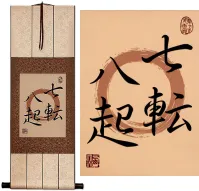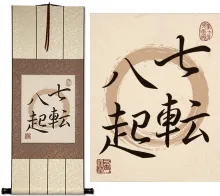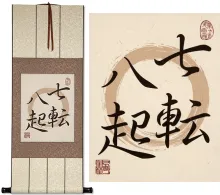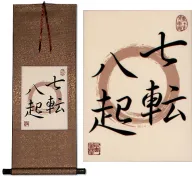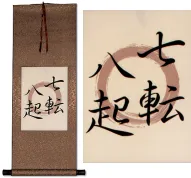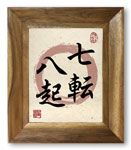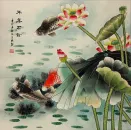Many custom options...
And formats...

Knock Down in Chinese / Japanese...
Buy a Knock Down calligraphy wall scroll here!
Personalize your custom “Knock Down” project by clicking the button next to your favorite “Knock Down” title below...
Push or Knock
To weigh one's words
During the Tang Dynasty, a man named Jia Dao (born in the year 779), a well-studied scholar and poet, went to the capital to take the imperial examination.
One day as he rides a donkey through the city streets, a poem begins to form in his mind. A portion of the poem comes into his head like this:
“The bird sits on the tree branch near a pond,
A monk approaches and knocks at the gate...”
At the same time, he wondered if the word “push” would be better than “knock” in his poem.
As he rides down the street, he imagines the monk pushing or knocking. Soon he finds himself making motions of pushing and shaking a fist in a knocking motion as he debates which word to use. He is quite a sight as he makes his way down the street on his donkey with hands and fists flying about as the internal debate continues.
As he amuses people along the street, he becomes completely lost in his thoughts and does not see the mayor's procession coming in the opposite direction. Jia Bao is blocking the way for the procession to continue down the road, and the mayor's guards immediately decide to remove Jia Bao by force. Jia Bao, not realizing that he was in the way, apologizes, explains his poetic dilemma and awaits his punishment for blocking the mayor's way.
The mayor, Han Yu, a scholar and author of prose himself, finds himself intrigued by Jia Dao's poem and problem. Han Yu gets off his horse and addresses Jia Bao, stating, “I think knock is better.” The relieved Jia Bao raises his head and is invited by the mayor to join the procession, and are seen riding off together down the street, exchanging their ideas and love of poetry.
In modern Chinese, this 反復推敲 idiom is used when someone is trying to decide which word to use in their writing or when struggling to decide between two things when neither seems to have a downside.
Fall Down Seven Times, Get Up Eight
Always rising after a fall or repeated failures
七転八起 is a Japanese proverb that relays the vicissitudes of life, with the meaning “seven times down eight times up.”
Some would more naturally translate it into English as “Always rising after a fall or repeated failures” or compare it to the English, “If at first, you don't succeed, try, try again.”
The first Kanji is literally “7.” The second means “fall down” (sometimes this Kanji means “turn around,” “revolve” or “turn over” but in this case, it holds the meaning of “fall”). The third is “8.” And the last is “get up,” “rouse,” or “rise.”
Basically, if you fail 7 times, you should recover from those events and be prepared to rise an 8th time. This also applies if it is the world or circumstances that knock you down seven times...
...just remember that you have the ability to bounce back from any kind of adversity.
Note: This can be pronounced in two ways. One is “shichi ten hakki” or “shichitenhakki.” The other is “nana korobi ya oki” also written, “nanakorobi-yaoki.”
Special Note: The second character is a Kanji that is not used in China. Therefore, please select a Japanese calligrapher for this title.
This in-stock artwork might be what you are looking for, and ships right away...
Gallery Price: $100.00
Your Price: $49.88
Gallery Price: $100.00
Your Price: $58.88
Gallery Price: $100.00
Your Price: $58.88
Gallery Price: $162.00
Your Price: $89.88
Gallery Price: $162.00
Your Price: $89.88
Gallery Price: $100.00
Your Price: $39.88
Gallery Price: $100.00
Your Price: $39.88
Gallery Price: $89.00
Your Price: $49.00
Gallery Price: $100.00
Your Price: $49.88
Gallery Price: $100.00
Your Price: $49.88
Gallery Price: $222.00
Your Price: $122.88
Gallery Price: $222.00
Your Price: $122.88
Not the results for knock down that you were looking for?
Below are some entries from our dictionary that may match your knock down search...
| Characters If shown, 2nd row is Simp. Chinese |
Pronunciation Romanization |
Simple Dictionary Definition |
撂 see styles |
liào liao4 liao |
to put down; to leave behind; to throw or knock down; to abandon or discard |
伸す see styles |
nosu のす |
(v5s,vi) (1) (kana only) to stretch; to extend; to lengthen; to spread; (v5s,vi) (2) (kana only) to gain influence; to become stronger; to increase (e.g. in scope); (v5s,vi) (3) (kana only) to go further; to extend one's journey; (transitive verb) (4) (kana only) to smooth out; to roll out; to spread out (something folded); (transitive verb) (5) (kana only) (also written 熨す) to iron out (creases); (transitive verb) (6) (kana only) to knock out; to knock down |
倒す see styles |
taosu たおす kokasu こかす |
(transitive verb) (1) to throw down; to bring down; to blow down; to fell; to knock down; to set (something) down on its side; to turn (something) on its side; (2) to kill; to defeat; to beat; (3) to overthrow; to trip up; to ruin; (4) to leave unpaid; to cheat; (v4s,vt) (archaism) to knock down; to knock over |
打倒 see styles |
dǎ dǎo da3 dao3 ta tao datou / dato だとう |
to overthrow; to knock down; Down with ... ! (noun, transitive verb) overthrow; defeat; bringing down; knockdown |
撂倒 see styles |
liào dǎo liao4 dao3 liao tao |
to knock down; to mow down |
撞倒 see styles |
zhuàng dǎo zhuang4 dao3 chuang tao |
to knock down; to knock over; to run over (sb) |
撞死 see styles |
zhuàng sǐ zhuang4 si3 chuang ssu |
to knock down and kill (with a car, train etc) |
擊倒 击倒 see styles |
jī dǎo ji1 dao3 chi tao |
to knock down; knocked down |
放倒 see styles |
fàng dǎo fang4 dao3 fang tao |
to knock over; to knock down; to lay flat; to fell; to bring down |
転す see styles |
kokasu こかす |
(v4s,vt) (archaism) to knock down; to knock over |
轢く see styles |
hiku ひく |
(transitive verb) (kana only) to run over (with a vehicle); to knock down |
倒かす see styles |
kokasu こかす |
(v4s,vt) (archaism) to knock down; to knock over |
打抜く see styles |
buchinuku ぶちぬく uchinuku うちぬく |
(transitive verb) (1) to punch; to hit and hit; to stamp out; (2) to pierce; to bore into; to knock down walls |
打落す see styles |
uchiotosu うちおとす |
(transitive verb) to knock down; to shoot down; to lop off |
撃落す see styles |
uchiotosu うちおとす |
(transitive verb) to knock down; to shoot down; to lop off |
撥ねる see styles |
haneru はねる |
(transitive verb) (1) (kana only) to hit (e.g. with a car); to knock down; (transitive verb) (2) (kana only) to reject; to eliminate; to exclude; to get rid of; (transitive verb) (3) (kana only) to refuse (e.g. a request); to deny; to turn down; (transitive verb) (4) (kana only) to flip; to splash; to splatter; (transitive verb) (5) (kana only) to take (a percentage); (v1,vt,vi) (6) (kana only) to stick up (e.g. of hair); to curl up (e.g. of a moustache); to sweep up (the end of a brush stroke); (v1,vi) (7) (kana only) to pronounce as a syllabic nasal |
転ばす see styles |
korobasu ころばす |
(Godan verb with "su" ending) to knock down; to topple |
うち抜く see styles |
uchinuku うちぬく |
(transitive verb) (1) to punch; to hit and hit; to stamp out; (2) to pierce; to bore into; to knock down walls |
カウント see styles |
kaunto カウント |
(noun, transitive verb) (1) count; counting; (noun, transitive verb) (2) {baseb} (See ボールカウント) count of balls and strikes; (noun, transitive verb) (3) {boxing} (See カウントアウト) count (after a knock-down); (4) count (of radioactivity); (personal name) Kaunto |
はっ倒す see styles |
hattaosu はったおす |
(transitive verb) to knock down |
ぶち抜く see styles |
buchinuku ぶちぬく |
(transitive verb) (1) to punch; to hit and hit; to stamp out; (2) to pierce; to bore into; to knock down walls |
ぶっ倒す see styles |
buttaosu ぶったおす |
(Godan verb with "su" ending) to knock down |
張っ倒す see styles |
hattaosu はったおす |
(transitive verb) to knock down |
張り倒す see styles |
haritaosu はりたおす |
(transitive verb) to knock down |
打ち倒す see styles |
uchitaosu うちたおす |
(transitive verb) to knock down; to defeat |
打ち抜く see styles |
buchinuku ぶちぬく uchinuku うちぬく |
(transitive verb) (1) to punch; to hit and hit; to stamp out; (2) to pierce; to bore into; to knock down walls |
打ち落す see styles |
uchiotosu うちおとす |
(transitive verb) to knock down; to shoot down; to lop off |
打ち貫く see styles |
uchinuku うちぬく |
(transitive verb) (1) to punch; to hit and hit; to stamp out; (2) to pierce; to bore into; to knock down walls |
打っ倒す see styles |
buttaosu ぶったおす |
(Godan verb with "su" ending) to knock down |
撃ち落す see styles |
uchiotosu うちおとす |
(transitive verb) to knock down; to shoot down; to lop off |
Click here for more knock down results from our dictionary
The following table may be helpful for those studying Chinese or Japanese...
| Title | Characters | Romaji (Romanized Japanese) | Various forms of Romanized Chinese | |
| Push or Knock | 反復推敲 反复推敲 | fǎn fù tuī qiāo fan3 fu4 tui1 qiao1 fan fu tui qiao fanfutuiqiao | fan fu t`ui ch`iao fanfutuichiao fan fu tui chiao |
|
| Fall Down Seven Times, Get Up Eight | 七転八起 | shichi ten hakki / nana korobi ya oki shichi ten haki / nana korobi ya oki | ||
| In some entries above you will see that characters have different versions above and below a line. In these cases, the characters above the line are Traditional Chinese, while the ones below are Simplified Chinese. | ||||
Successful Chinese Character and Japanese Kanji calligraphy searches within the last few hours...


